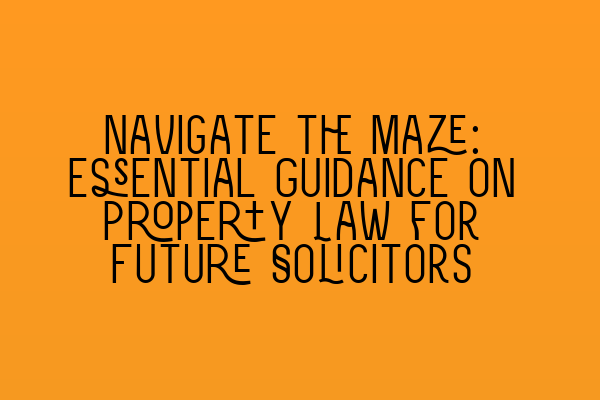Navigate the Maze: Essential Guidance on Property Law for Future Solicitors
As a future solicitor, it is important to navigate the complexities of property law with confidence. Understanding the intricacies of this branch of law is essential to effectively represent clients in real estate transactions, landlord-tenant disputes, and other property-related matters.
In this comprehensive guide, we will provide you with essential guidance on property law to help you navigate the maze of rules and regulations in this fascinating area. Whether you are studying for the SQE exams or looking to enhance your knowledge and skills as a property law practitioner, this guide will serve as a valuable resource.
1. Introduction to Property Law
Property law encompasses a wide range of legal principles and statutes that govern the ownership, use, and disposition of real property. It includes laws related to land, buildings, fixtures, and anything permanently attached to the land. Understanding the foundational concepts of property law is the first step in becoming a proficient property law practitioner.
To test your knowledge of property law basics, you can take our SQE 1 Practice Exam Questions.
2. Types of Property Ownership
Property can be owned in different ways, and it is crucial to understand the various types of property ownership to advise clients accurately. Common forms of property ownership include freehold, leasehold, and commonhold. Each type has its own rights, responsibilities, and limitations. By having a firm grasp on these distinctions, you can effectively assess the legal rights of property owners and non-owners.
3. The Conveyancing Process
Conveyancing is the legal process of transferring property from one party to another. It involves a series of complex steps, including obtaining title searches, drafting contracts, conducting surveys, and registering documents. Familiarizing yourself with the conveyancing process is essential to ensure a smooth and legally valid property transfer. Our SQE 2 Preparation Courses cover conveyancing in detail.
4. Landlord and Tenant Law
Landlord and tenant law governs the relationship between property owners (landlords) and those renting or leasing the property (tenants). This area of law covers a wide range of issues, such as lease agreements, eviction processes, rent control, and property maintenance obligations. Understanding the rights and obligations of landlords and tenants is crucial in resolving disputes and providing effective legal advice.
5. Real Estate Finance and Mortgages
Real estate finance and mortgages play a vital role in property transactions. Understanding how mortgage financing works, including the different types of mortgages and their associated risks, is essential for both buyers and lenders. Furthermore, knowledge of real estate financing options can help clients make informed decisions and minimize potential legal issues.
6. Dispute Resolution in Property Law
Disputes are an inevitable part of the property law landscape. Familiarize yourself with alternative dispute resolution methods such as negotiation, mediation, and arbitration, as they can help clients avoid costly and time-consuming court proceedings. Having a good grasp of dispute resolution techniques will also enable you to provide clients with effective advice on resolving property disputes in a timely and cost-effective manner.
7. Property Law and Environmental Matters
Environmental concerns are increasingly shaping property law. Understanding the legal requirements and implications related to land contamination, environmental assessments, and sustainability regulations is crucial in advising clients on environmental matters. Keeping up-to-date with the evolving landscape of environmental property law is essential to ensure compliance and mitigate potential environmental risks.
For further practice on property law concepts, you can take our SQE 1 Practice Mocks FLK1 FLK2.
Final Thoughts
Property law is a complex and dynamic area of law that requires a deep understanding of both foundational principles and current legal developments. By familiarizing yourself with the essential concepts and components of property law, you will lay a solid foundation for a successful career as a property law solicitor.
If you are preparing for SQE exams or aiming to enhance your understanding of property law, consider taking our comprehensive SQE 1 Preparation Courses to further refine your knowledge and skills.
For important dates related to SQE exams, please refer to the SRA SQE Exam Dates.
We hope this guide has provided you with valuable insights into property law. Remember, continuous learning and staying updated with legal developments are essential for success in this field.
